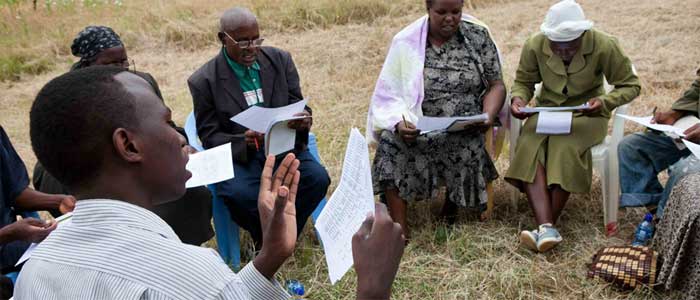 If the whole point of open aid data is to make recipients and donors accountable for their use of aid resources to create positive change in developing countries, how can we make sure that this data reaches the people and communities who need it most?
If the whole point of open aid data is to make recipients and donors accountable for their use of aid resources to create positive change in developing countries, how can we make sure that this data reaches the people and communities who need it most?
As open data enthusiasts, we tend to assume that if it is available online, it will be used. My experience of the past 10 years tells me to be wary of these assumptions. The promises of aid transparency are not just a click away, as is highlighted in a pilot research undertaken by the World Bank Open Finances and the World Bank Institute’s Open Contracting programs in Indonesia and Kenya.
 « Data that is publically available is not necessarily data that is practically open« , write Samuel Lee and Felipe Estefan in The Demand for Open Financial Data, a draft report open for consultation and input. « More must be done, beyond disclosure, to ensure that data is disseminated at the ground level and used more widely. » A challenge for open data initiatives, write the authors, is that « around 65 percent of the world’s population is offline. Even in contexts where the availability of internet is less of an issue, lack of use or lack of relevant capacities can also be an issue. »
« Data that is publically available is not necessarily data that is practically open« , write Samuel Lee and Felipe Estefan in The Demand for Open Financial Data, a draft report open for consultation and input. « More must be done, beyond disclosure, to ensure that data is disseminated at the ground level and used more widely. » A challenge for open data initiatives, write the authors, is that « around 65 percent of the world’s population is offline. Even in contexts where the availability of internet is less of an issue, lack of use or lack of relevant capacities can also be an issue. »
To understand the demand in developing countries for the data that the World Bank produces, the research ran online surveys and included case studies in rural communities with no access to the Internet.
In Kenya, the researchers gathered a group of farmers, traders, artisans, students, NGO workers and local government officials and administrators in a rural community about 100 km south-east of Nairobi. Information found on opendata.go.ke and finances.worldbank.org was filtered for them, translated, and provided on sheets of paper for discussion and feedback. Suddenly, financial data felt like something very close to home.
Some selected exerpts from the draft paper…
 « Open financial data and contracting data (often cited as complex and difficult to understand) was readily processed and understood by citizens at the local level, and there was great interest in seeing contract award information for local projects. »
« Open financial data and contracting data (often cited as complex and difficult to understand) was readily processed and understood by citizens at the local level, and there was great interest in seeing contract award information for local projects. »
« As expected, there was a lot of knowledge about projects in the community, but the information provided including fields like budget, funding allocation, official project status, yearly breakdowns of commitments and expenditures, suppliers, contract award amounts, and contract descriptions were all new bits of information. »
 Like in Indonesia, volunteers took community-generated posters to a local market the following day, where the creators of the posters explained and shared their work with vendors and residents. « A large number of interactions took place in and around the market. There was plenty of feedback about the projects themselves and about the channels and processes of communicating this feedback to local officials for action. »
Like in Indonesia, volunteers took community-generated posters to a local market the following day, where the creators of the posters explained and shared their work with vendors and residents. « A large number of interactions took place in and around the market. There was plenty of feedback about the projects themselves and about the channels and processes of communicating this feedback to local officials for action. »
« A common knock against financial and contracting data is that it is too complex or complicated for the average person to understand and process; however, this did not appear to be the case at the village level in Indonesia. When asked to rank types of development information, participants in Desa Ban indicated budget allocation, project objectives, the project selection process, budget monitoring (projected budgets vs expenditures), and procurement and contracting as priorities. The experience also appears to confirm that the value of financial and contract information comes from its ties to specific activities and links to existing community priorities. »
Some more excerpts…
 « Since the early phases of the open data movement, says the study, demand-side considerations have commonly followed the supply of data, rather than informed it. (…) Supply and demand of data should not be sequenced one after the other, but should inform each other at all times. »
« Since the early phases of the open data movement, says the study, demand-side considerations have commonly followed the supply of data, rather than informed it. (…) Supply and demand of data should not be sequenced one after the other, but should inform each other at all times. »
« There are many encouraging signs that open development data, particularly financial data, is readily consumable and relevant when filtered and translated and taken offline. »
« Access to information is just the start. Real impact can only come from more inclusive and interactive methods and means of communication. This can help transform citizens from passive consumers (or non-consumers) of information to active agents of engagement with information in their communities. »
« Understanding this type of demand for financial data has significant implications for aid transparency and open development, especially for development organizations and governments at various stages of publishing open data or strategizing about the release of open data. »




Laisser un commentaire
Rejoindre la discussion?N'hésitez pas à contribuer !